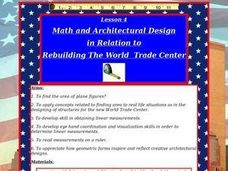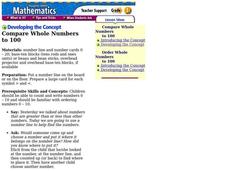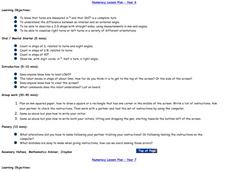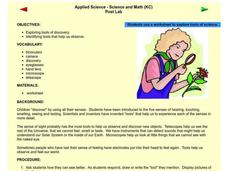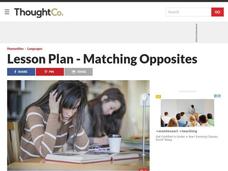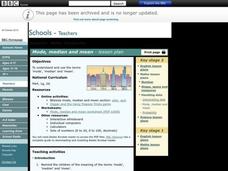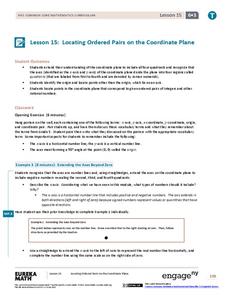Curated OER
All in the Family
Students use data to make a tally chart and a line plot. They find the maximum, minimum, range, median, and mode of the data. Following the video portion of the lesson, students will visit a Web site to test their data collection skills...
Curated OER
Math in Society
Learners critique and compare loan purchases dealing with credit rating, beacon scores, and credit-scoring systems. They define vocabulary associated with the lesson. Students deduce an individuals beacon score.
Curated OER
Math and Architectural Design in Relation to Rebuilding The World Trade Center
Learners discover building plans and practice reading measurements. In this architectural design lesson plan, students investigate the areas of the specific World Trade Center locations that need to be rebuilt and determine the...
Curated OER
Compare Whole Numbers to 100
Students practice comparing whole numbers. In this number comparison lesson plan, students use number lines, number cards, base-ten blocks, and bean sticks to practice comparing whole numbers that range to 100. Students follow the...
Curated OER
Origami Ducks: Geometry, Listening, and Following Directions
Make origami ducks with your class to reinforce geometry concepts and vocabulary; develop fine motor and visual translation skills; and enrich study of Japanese culture, the pond habitat, or migration. Create a whole group "worksheet"...
Curated OER
How Many More?
Students complete subtraction problems where they use goldfish crackers as their manipulatives in the problem. In this subtraction lesson plan, students use words and pictures to also show their problems.
Curated OER
Numeracy Lesson Plans
Students complete a series of lesson plans dealing with numbers, counting, and ordering. In this numbers lesson plan, students identify numbers, identify number patterns, count forwards and backwards, and more.
Curated OER
Applied Science - Science and Math Post-Lab
Students use scientific tools. In this Applied Science lesson, students investigate the use of scientific tools to enhance observation and discovery. Students indicate how each tool assists scientific work.
Curated OER
Applied Science - Science and Math Pre Lab
Students explore human senses. In this applied Science lesson, students utilize their senses to distinguish various objects. Students explain their descriptions.
Curated OER
Applied Science-Science and Math (2A) Post Lab
Second graders create a graph about TV watching. In this bar graph lesson, 2nd graders make a hypothesis about how much TV 2nd graders watch per week. They record their TV watching for a week and bring it to school to create a class...
Curated OER
What's on Sale?
Students explore sale items. In this money and percent math lesson, students work in groups to locate food ads in the newspaper. Students identify sales and calculate final prices using percentage discounts. Students...
Curated OER
Euler's Method Introduction
Young mathematicians define and use Euler's method to solve problems in this calculus lesson. Learners visualize graphs and solve differential equations. They create these visuals on the TI calculator.
Curated OER
Time & Itineraries Two
Students explore time management by participating in itinerary activities. In this time telling lesson, students identify how to read a clock, how to communicate the time to others and how to plan for events in the day. Students practice...
Curated OER
Presentation of Our Family
Although there is no real lesson plan included here, you could easily recycle the idea! Get kids using vocabulary related to family, age, feelings, and nationality. Start by teaching basic vocabulary words and phrases (you'll need to...
Curated OER
Lesson Plan - ESL Vocabulary Lesson Plan - Opposites for Advanced Level Learners
Pupils in small groups work on opposites worksheet.
Curated OER
Mode, Median, and Mean
Students define mode, median and mean, and perform mathematical operations to determine these 3 terms. In this statistics/math lesson plan, students practice memory strategies to help distinguish between mode, median, and mean. Students...
Curated OER
Worksheet on Geometry Terms
Tenth graders complete a 25 question worksheet identifying geometric terms. In this geometry lesson plan, 10th graders unscramble words representing important geometric concepts and are writing defining the vocabularies related to the...
EngageNY
Points of Concurrencies
You say that perpendicular bisectors intersect at a point? I concur! Learners investigate points of concurrencies, specifically, circumcenters and incenters, by constructing perpendicular and angle bisectors of various triangles.
EngageNY
Locating Ordered Pairs on the Coordinate Plane
Four quadrants, four times the fun. Future mathematicians learn the terminology associated with the coordinate plane and how to plot points in all four quadrants. A worksheet tests their understanding of the material in the 16th...
EngageNY
Secant and the Co-Functions
Turn your class upside down as they explore the reciprocal functions. Scholars use the unit circle to develop the definition of the secant and cosecant functions. They analyze the domain, range, and end behavior of each function.
EngageNY
Construct an Equilateral Triangle (part 1)
Drawing circles isn't the only thing compasses are good for. In this first installment of a 36-part series, high schoolers learn how to draw equilateral triangles by investigating real-world situations, such as finding the location of a...
Virginia Department of Education
Independent and Dependent Variables
Investigate the relationship between independent and dependent variables. Individuals begin by identifying independent and dependent variables from different problem situations. Then, using specific guidelines, they create posters...
EngageNY
Translations
Learn through constructions! Learners examine a translation using constructions and define the translation using a vector. Pupils then construct parallel lines to determine the location of a translated image and use the vector as a guide.
EngageNY
Exponential Notation
Exponentially increase your pupils' understanding of exponents with an activity that asks them to explore the meaning of exponential notation. Scholars learn how to use exponential notation and understand its necessity. They use negative...


